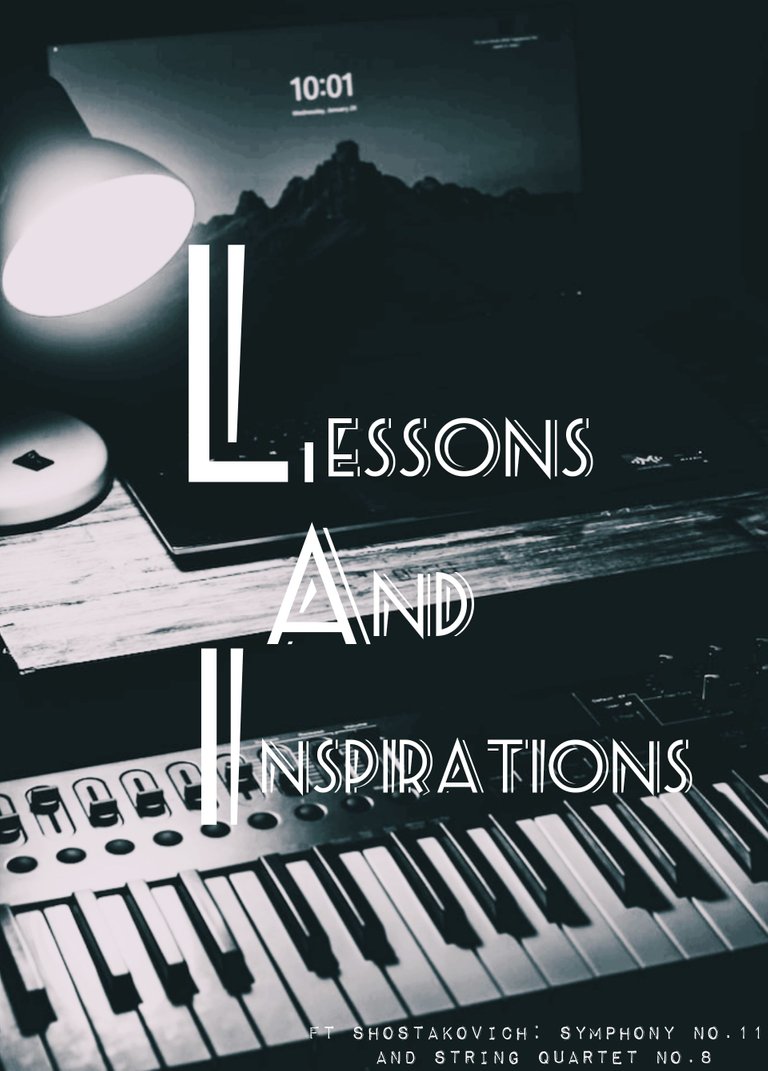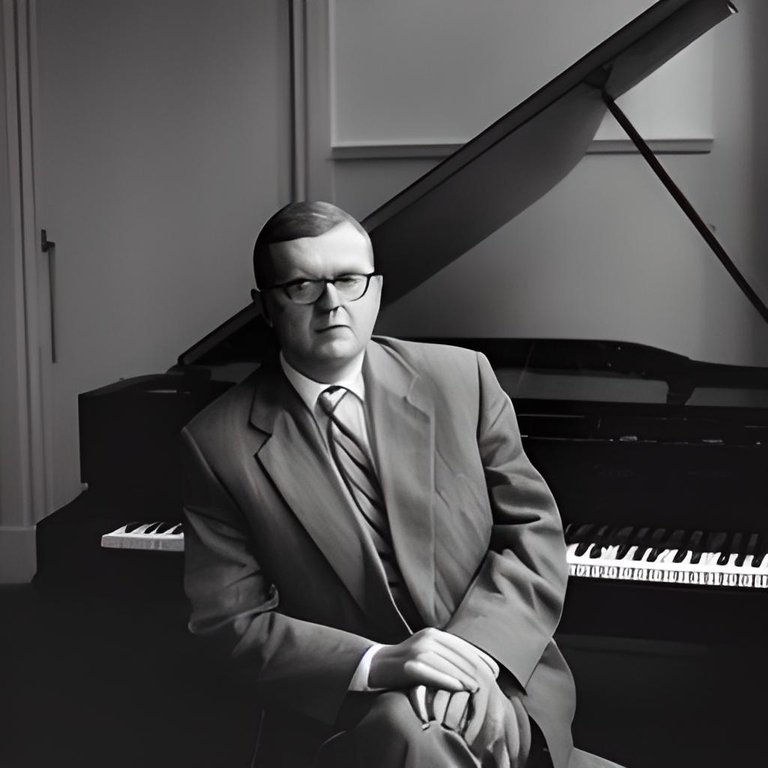NOTE:
NOTE:You can click either of these two links to visit the rest of the series😄
You can click either of these two links to visit the rest of the series😄⏪ PREV || NEXT⏩

Now I can say with full certainty in my heart, that this is one of the very few pieces of music that has never ceased to leave me in awe, depression, and inscrutable horror all at the same time.
It is true that the hands which penned down this tragic pieces of music, suffered a great deal of immortal turmoil. More so, because of the Soviet union but, we will certainly expatiate more on this later as today's post progresses.
However now, in order to give you just a little idea of how intensely grieving Shostakovich's music was, here are two thought provoking quotes — one from an attendee, and another from the performers:
The respective pieces, you can find below.
𝚃𝚑𝚛𝚘𝚞𝚐𝚑 𝚕𝚒𝚜𝚝𝚎𝚗𝚒𝚗𝚐 𝚝𝚘 𝚝𝚑𝚎 𝚜𝚒𝚕𝚎𝚗𝚌𝚎𝚜 𝚊𝚗𝚍 𝚝𝚑𝚎 𝚍𝚎𝚜𝚘𝚕𝚊𝚝𝚒𝚘𝚗, 𝚝𝚑𝚎 𝚟𝚒𝚘𝚕𝚎𝚗𝚌𝚎 𝚊𝚗𝚍 𝚝𝚑𝚎 𝚝𝚛𝚊𝚐𝚎𝚍𝚢, 𝚊𝚗𝚍 𝚞𝚜𝚒𝚗𝚐 𝚝𝚑𝚊𝚝 𝚝𝚘 𝚒𝚖𝚊𝚐𝚒𝚗𝚎 𝚑𝚒𝚜 𝚠𝚘𝚛𝚕𝚍… 𝚕𝚒𝚔𝚎 𝚊 𝚕𝚎𝚝𝚝𝚎𝚛 𝚏𝚛𝚘𝚖 𝚊 𝚏𝚘𝚛𝚋𝚒𝚍𝚍𝚎𝚗 𝚙𝚕𝚊𝚌𝚎 𝚝𝚑𝚊𝚝 𝚠𝚎 k𝚗𝚘w 𝚗𝚘𝚝𝚑𝚒𝚗𝚐 𝚘𝚏.
…𝚃𝚑𝚎𝚜𝚎 𝚙𝚒𝚎𝚌𝚎𝚜 𝚜𝚝𝚊𝚗𝚍 𝚊𝚜 𝚊𝚗 𝚊𝚞𝚛𝚊𝚕 𝚛𝚎𝚙𝚛𝚎𝚜𝚎𝚗𝚝𝚊𝚝𝚒𝚘𝚗 𝚘𝚏 𝚊𝚗 𝚒𝚗𝚌𝚛𝚎𝚍𝚒𝚋𝚕𝚎 𝚜𝚙𝚎𝚌𝚝𝚛𝚞𝚖 𝚘𝚏 𝚑𝚞𝚖𝚊𝚗 𝚝𝚛𝚊𝚐𝚎𝚍𝚢 𝚊𝚗𝚍 𝚜𝚞𝚏𝚏𝚎𝚛𝚒𝚗𝚐, 𝚠𝚒𝚝𝚑 𝚘𝚌𝚌𝚊𝚜𝚒𝚘𝚗𝚊𝚕 𝚐𝚕𝚒𝚖𝚙𝚜𝚎𝚜 𝚘𝚏 𝚑𝚘𝚙𝚎𝚏𝚞𝚕𝚗𝚎𝚜𝚜.
𝙰𝚝 𝚝𝚑𝚎 𝚘𝚙𝚎𝚗𝚒𝚗𝚐 𝚘𝚏 𝚝𝚑𝚎 𝚏𝚘𝚞𝚛𝚝𝚑 𝚖𝚘𝚟𝚎𝚖𝚎𝚗𝚝… 𝚝𝚑𝚎𝚛𝚎’𝚜 𝚊 𝚜𝚞𝚜𝚝𝚊𝚒𝚗𝚎𝚍 𝚝𝚘𝚗𝚎 𝚒𝚗 𝚝𝚑𝚎 𝚏𝚒𝚛𝚜𝚝 𝚟𝚒𝚘𝚕𝚒𝚗, 𝚊𝚗𝚍 𝚝𝚑𝚎𝚗 𝚊𝚕𝚕 𝚘𝚏 𝚊 𝚜𝚞𝚍𝚍𝚎𝚗 𝚝𝚑𝚛𝚎𝚎 𝚍𝚒𝚜𝚜𝚘𝚗𝚊𝚗𝚝 𝚌𝚑𝚘𝚛𝚍𝚜 𝚊𝚛𝚎 𝚙𝚕𝚊𝚢𝚎𝚍…𝚒𝚝 𝚜𝚘𝚞𝚗𝚍𝚜 𝚕𝚒𝚔𝚎 𝚝𝚑𝚊𝚝 𝚔𝚗𝚘𝚌𝚔 𝚘𝚗 𝚝𝚑𝚎 𝚍𝚘𝚘𝚛 𝚒𝚗 𝚝𝚑𝚎 𝚖𝚒𝚍𝚍𝚕𝚎 𝚘𝚏 𝚝𝚑𝚎 𝚗𝚒𝚐𝚑𝚝 𝚝𝚑𝚊𝚝 𝚜𝚘 𝚖𝚊𝚗𝚢 𝚁𝚞𝚜𝚜𝚒𝚊𝚗 𝚙𝚎𝚘𝚙𝚕𝚎 𝚍𝚛𝚎𝚊𝚍𝚎𝚍…

Massimo
Ahh... Shostakovich: an absolutely brilliant and probably even the most underrated composer! A first class chain smoker, a seasoned tormented soul, and probably the only man ever to have inscribed his intials (D-S-C-H) into a death note that was his eight string quartet. Yes yes... from face value, this composer might seem to have lived a very tragic, tormented, and gravely unnerving life — and you know what?... He did!
However once again, to truly demonstrate how even amidst all his tragedies, there is still a gleaming light of inspiration ... We must first explore his "backstory" so to speak.
Well then... Shall we?
of Shostakovic

Image created with dream studio AI
Born in St Petersburg, Russia in 1906, Shostakovich studied piano with his mother at the early age of 9 before he later began studying under the directions of the leading composer Alexander Glazunov in a local Conservatoire. Of course, later on, he would go on to make a name for himself in the music world as an accomplished composer and pianist publishing as many as 15 symphonies, 15 string quartets, 6 concertos, 2 piano quintets, two string octets, and one piano quintet. He also wrote several works for the piano such as his 2 sets of preludes, fugues, and sonatas with several other dramatic works such as operas, song cycles, ballets, and even film music.
Most of Dmitri Dmitri Shostakovich's life and career correlated very much with the vile history of the Soviet union. Forced to live most of his life in a dictatorial regime, Shostakovich was very much aware of Stalin and his horrific five year plan that brought about the death of over a million poles and Russians alike. In his words, he described life under Stalin as :"unbelievably mean and hard. Every day brought more bad news and I felt so much pain. I was so lonely and afraid.”
During his reluctant service to the USSR, Shostakovich was nearly executed twice(once in 1935 and the other, in 1948) however, he mainly survived due to the fact that the powers considered him a Yurodivy - a village idiot, a fool, one who who protested in the name of humanity and not in the name of political change.
Many times, he saw his friends captured and murdered right in front of his eyes which of course, resulted in the abandonment of many other friends and acquaintances he had previously thought of as supporters. Simply knowing him then was dangerous enough already, but to engage with him in anyway, potentially fatal. At the very end though, it's would seem as though he mainly survived the entire regime, by cleverly playing through the system, cautiously remaining incognito with his music and works. Of course, this dubbed him somewhat weak and cowardly to which he himself acknowledged!
In one of his Letters written to a close friend of his, Shostakovich hysterically loathed on his reluctant decision to have joined the communist party:
I’m scared to death of them’; ‘You don’t know the whole truth’; ‘From childhood I’ve always had to do things I didn’t want to do’; ‘I’ve been a whore, I am and always will be a whore!’
String Quartet No.8
Completed July 14, 1960 over an astonishing period of 3 days, Shostakovich's String quartet No. 8 is an absolutely heart breaking and bone chilling five movement piece, scored for two violins, one viola, and a cello.
Five days after completing the piece, Shostakovich wrote to his close friend Isaac Glikman:
“I’ve [just finished] an ideologically deficient quartet that nobody needs. I reflected that when I die it’s not likely anyone will write a quartet dedicated to my memory. So I decided to write it myself. You could even write on the cover [of this string quartet]: ‘Dedicated to the memory of the composer of this quartet.’”
At face value, this might just seem like good old Shosta chipping in some of his classic dark humor, but when analysed further, we realise that apparently, Shostakovich was planning on taking his life and that string quartet, was just his final death note.
According to another friend of Shostakovich, Lev Lebendinsky, it was noted that:
Shostakovich purchased a large number of sleeping pills. He played the quartet to me on the piano and told me with tears in his eyes that it was his last work. I managed to remove the pills from his jacket pocket and gave them to his son Maxim. I pleaded with him not to let his father out of his sight. During the next few days I spent as much time as possible with Shostakovich until I felt the danger of suicide had passed."
Although originally dedicated "To the Memory of the Victims of Fascism and War”, in reality, the string quartet was dedicated to no other than Shostakovich himself! In the same letter written to Glikman, Shostakovich writes:
The main theme [of the quartet] is my monogram, D, S, C, H [D Eb C B], that is, my initials [in German notation, Eb = “S”, H = B natural].
“The quartet makes use of themes from my works and the revolutionary song: Tormented by Grievous Bondage. My own themes are the following: from the First Symphony, the Eighth Symphony, the Piano Trio No. 2, the first Cello Concerto, and Lady Macbeth. Wagner’s Funeral March from Gotterdammerung and the second theme from the first movement of Tchaikovsky’s Sixth Symphony are also hinted at. And I forgot – there’s also a theme from my Tenth Symphony. Quite something – this little miscellany!
And finally, Shostakovich concludes with a very heartbreaking ending:
The pseudo-tragedy of the quartet is so great that, while composing it, my tears flowed as abundantly as urine after downing half-a-dozen beers. On arrival home, I have tried playing it twice, and have shed tears again.”
The Symphony No. 11(The Year 1905)
Written 1957 and premiered by the USSR symphony orchestra the same year, Shostakovich's symphony No.11 is a four movement piece filled with melancholy, action, and straight up horror!
With its subtitle title, The Year 1905, the piece depicts the horrific events of the Russian revolution of 1905. In the book Testimony written by Solomon Volkov, Shostakovich is quoted saying:
Our family discussed the Revolution of 1905 constantly… the stories deeply affected my imagination. When I was older I read much about how it all happened… They were carting a mound of murdered children on a sleigh. The boys had been sitting in the trees, looking at the soldiers, and the soldiers shot them – just like that, for fun. They then loaded them on the sleigh and drove off. A sleigh loaded with children’s bodies. And the dead children were smiling. They had been killed so suddenly that they hadn’t time to be frightened.
After the end of the premier of this symphony, one elderly lady was overhead saying: "Those aren’t horns firing, they are tanks roaring, and people being squashed." To which Shostakovich replied: "That means she understood it." Again, due to this symphony being a sort of diss to the Soviet regime, it was reported that even the composer's own son was noted remarking to his father after the premier: "Papa, what if they hang you for this?’". However, Shostakovich was not hanged but rather, praised for composing such a wonderful and brilliant piece of music. Infact, he ended up winning the Lenin Prize for best composer, a year later for the piece. Of course, this was somewhat ironic, considering how the piece had garnered so much PRAISE from the very REGIME it was meant to secretly diss :)
Today, this symphony is often regarded by most as some type of film music or a movie without pictures due to its sheer poetic imagery. Ah yes, I'll never forget the night I first listened to this piece myself: there I was in bed, it was dark and there was a heavy storm outside; and once I had finally finished listening through the approximately 1 hour piece, I was shaken and broke down in tears, unable to move my body at all.
Yes, that's just how powerfully moving the music was to me.
Summary

Ultimately, at the end, Shostakovich died more or less a broken man at the age of 68, in a Moscow hospital. Due to his severe intake of alcohol and chronic chain smoking, he died of Lung cancer. However, he was praised by the official notice for ”finding his inspiration in the reality of Soviet life, reasserting and developing in his imagination the arts of socialist realism.” And in retrospect, we couldn't agree more.
Through the life of Shostakovich we learn a handful of many things but just to name a few, we learn to:
Find inspiration and creativity even through the darkest of times: I mean can you imagine how painfully perilous it must've been for Shostakovich to write beautiful music, while a person was most likely getting shot or slaughtered outside?
Survive no matter what: It takes courage and guts to do some of the things Shostakovich did to survive. In reality, he really was a "whore" to the Soviet nation. But at the end, look what happened — Stalin and the rest died way before he did.
Inspire others: Much like yourself, people need some form of inspiration to keep em going along the way; and to those people who suffered the purge of the USSR, Shostakovich's music did just that! With all those subtle hints of hope, encouragement, diss, irony and even humor the composer hid within his music, Shostakovich was able to tell the people without using words that "hey, we're in this together and we'll certainly get out of it together!"
Keep good friends: Even if you're a loner that enjoys the company of themselves, it's always advisable to keep atleast one close friend. Much like Shostakovich, you never know when that friend could save you from commiting suicide or some other atrocity one day.
Well, that's all for now, hopefully you were able to gain a little inspiration and enlightenment from this tragic life story. Until next time, when we delve into the inspiring world of Michael Jackson.
What a life and struggle, and beautiful music. Interestingly, when I studied, Shostakovich was not in the top of my favourites, but I played some piano pieces which were part of the curriculum. It's because as children we didn't really understand his music and life background.
He for sure deserves a lot higher place in my list too, as you are right, he is underrated.
Inspiration - of course! 🎶🎶🎶🎶
I can understand your POV there. Shostakovich's type of music isn't exactly all... sweet singable melodies or even melodies AT ALL to say the least. It's more or less atonal, or even better - descriptive. Regardless of the style though, his music always manages to paint a picture.
I believe shostakovich's music is quite influential, especially today in modern music!. I can see how composers like John Williams, and Alan Silvestri might've taken notes and inspirations from shostakovich's symphonies, for their film scores.
Lol, that reminds me! I should write a chapter about John Williams! He's legendary!
So YEAH - defs underrated. I mean have you heard his Piano concerto No 2?...Simply out of this world!
The second movement definitely can give a lot of inspiration to the composers while working on their film scores 💙
All unsourced images and illustrations are mine thank you :)